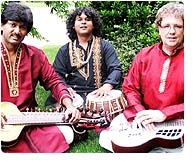|
|
 |
 An Upward Slide:
An Upward Slide:
Slide to Freedom Finds the Divine Crossroads of Indian Classical and Southern Sacred Music on 20,000 Miles
They sat in silence, holding their breath as the last note of a wild, twining jam faded in a legendary Memphis studio. “Well, what are we going to call that?” laughed sacred steel elder Calvin Cooke, looking across the room at the 17th-generation Indian virtuoso, the hard-touring Canadian folk musician, the merry tabla whiz, the bold singer-songwriter from Austin.
The answer: Slide to Freedom, an ongoing conversation exploring where many sliding, singing strings from across the planet meet. Created by established roots and world music multi-instrumentalist Doug Cox and revered Indian classical master Salil Bhatt, the project brings together fantastic flights of musicianship, wild slide inventions, and the great, transcendent ache that unites sacred songs and deeply personal ballads.
On 20,000 Miles (Northern Blues; October 11, 2011), the band, now regularly joined by Canadian-Indian percussionist Cassius Khan, collaborated with Calvin Cooke, founding father of sacred steel, and members of electric gospel legends The Campbell Brothers, as well as special guest BettySoo, the Americana-inspired darling of Austin’s singer-songwriter scene.
Striking Indian classical pieces weave into newly forged spirituals. Unexpected covers (Hank Williams, Chuck Berry, The Zombies) trade licks with ghazals (Northern Indian songs touching on the divine and erotic). Sacred steel sounds alternate with the ingenious complexity of Bhatt’s satvik veena (a hybrid between a slide guitar and the traditional Indian veena) and Cox’s unique instrumentarium. The result: a catchy, uplifting reflection on the transcendent buzz and moan of mortality.
~~~
“Down in Memphis, we had three members of the Campbell Brothers, though the whole band came to watch. We had Calvin Cooke, a Korean-American singer, two guys from India, and a white guy, me,” Cox laughs. “When we were setting up, someone called Boo Mitchell,” the second-generation head of the legendary Royal Recording Studios. “They asked who he was recording, and he answered, ‘The Rainbow Coalition!’”
But this wasn’t about diversity for its own sake, or for quirky novelty. This was a serious, if unexpected, meeting of musical minds. “We weren’t just looking at charts and banging off parts,” Cox continues. “We were interested in what the others were doing—and in taking risks.”
“At the start of the Memphis session, you could feel the different players ripple in and out of confidence, between riffing and tiptoeing because they didn’t want to stomp all over each other,” Soo recalls. “We were all trying to get an idea of where the person would go next. But at the end of the day, everyone let loose. It was magical.”
The session’s breathless final moment and Cooke’s quip came at the end of the grimly named yet musically uplifting “Suicislide,” a free-form dash that harnessed Khan’s vocal abilities and challenged Soo to reach deep, far out of her usual comfort zone.
“Calvin was sitting there, this serene wizard, but as soon as he put his hand to the strings, he created these amazing moments. He could really hold a groove and make it refreshing,” notes Khan. The elder statesman of sacred steel, a recently evolved grass-roots slide style born in Southern churches, Cooke’s bittersweet lines feel at home with Khan’s tender percussion on Soo’s intense “Still Small Voice.”
The heartfelt precision of Khan’s tabla is matched by the seemingly effortless solos that flow from Bhatt and Cox. Often cheekily compared to Jimi Hendrix, Bhatt can shred, but can also make his strings express deep subtleties backed by 500 years of family tradition and a lifetime of rigor. Cox, equally at home on a variety of instruments and in a range of genres, adds distinctive, gritty vocals and intriguing timbres, letting his gadgie (a metal resophone developed by an eccentric English instrument maker) rumble out tasty bass lines.
With years of collaboration behind them, Bhatt and Cox have reached a new level of friendship and interaction on 20,000 Miles, one that moves away from long-format cross-cultural jams to nuanced ballads and carefully crafted instrumentals. “Salil has the ability to reach out to audiences that might not be able sit still for Indian Classical music,” Cox explains. “He was playing to reach out to North Americans in a new way, rather than just responding. Together, we found a way to make both traditions more compact and accessible to new listeners.”
Yet Bhatt, Cox, and Khan carefully kept true to the spirit and practice of Indian classical music, while digging deeper into gospel and country. For more classical pieces like “Vishwakans”—composed by Bhatt’s renowned father Vishwa, a frequent guest musician with Slide to Freedom—the trio recorded together in Khan’s Vancouver-area living room, sitting in a circle on the floor.
“With our Indian Classical background, Salil and I had to retain the appropriate feel, while leaving room for Doug’s input. For the ghazal (‘Anjuman’), we all had to remain more traditional,” says Khan, a rare perfomer who can play tabla and sing at the same time. “But for many of the other compositions, we three relied on our uncanny intuition. We winked through it and jumped in with both feet.”
<< release: 10/11/11 >>
|
|
 |
|
|
|